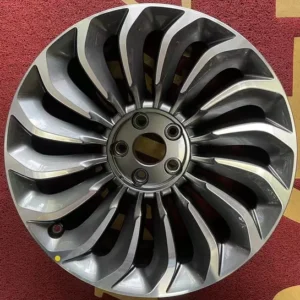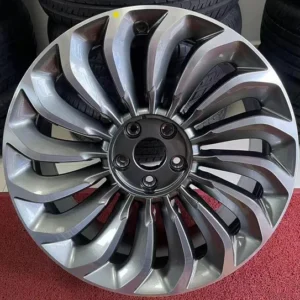Top 10 Must-Have Automotive Parts & Accessories for Commercial Vehicles - Enhance Your Fleet's Performance!
Commercial vehicles are an essential part of any business, and ensuring they are well-equipped and maintained is crucial for optimal performance. In this article, we will discuss the top 10 must-have automotive parts and accessories for commercial vehicles, providing solutions to enhance your fleet's performance. By understanding the importance of these components and their applications, you can make informed decisions to keep your commercial vehicles running smoothly.
1. Tires
Tires are one of the most critical components of a commercial vehicle. They are responsible for providing traction, stability, and safety on the road. Here are some key points to consider when selecting tires for your commercial vehicle:
- Product Parameters: Tires should be chosen based on their load capacity, speed rating, and tread life. For example, a tire with a load index of 310 can carry up to 6,614 pounds, while a speed rating of T means it can safely travel at speeds up to 118 mph.
- Usage Scenarios: Tires should be selected based on the type of terrain and weather conditions your commercial vehicle will encounter. For instance, all-season tires are suitable for various weather conditions, while mud and snow tires are ideal for off-road and winter driving.
- Use Cases: Company A, a logistics company, replaced their fleet's tires with all-season tires, resulting in improved fuel efficiency and reduced downtime due to tire-related issues. Company B, a construction company, switched to mud and snow tires for their heavy-duty trucks, which significantly improved their performance in challenging weather conditions.
2. Brakes
Brakes are crucial for ensuring the safety of your commercial vehicle and its occupants. Here are some important aspects to consider when selecting brakes for your fleet:
- Product Parameters: Brakes should be chosen based on their stopping power, durability, and ease of maintenance. For example, disc brakes are known for their excellent stopping power and durability, while drum brakes are more cost-effective.
- Usage Scenarios: Brakes should be selected based on the weight and load capacity of your commercial vehicle. For instance, heavy-duty trucks require more powerful brakes to handle their weight and cargo.
- Use Cases: Company C, a transportation company, upgraded their fleet's brakes to disc brakes, resulting in shorter stopping distances and reduced wear and tear on the braking system. Company D, a waste management company, replaced their drum brakes with disc brakes, which improved their overall performance and safety on the road.
3. Batteries
Batteries are essential for providing power to your commercial vehicle's electrical systems. Here are some key points to consider when selecting batteries for your fleet:
- Product Parameters: Batteries should be chosen based on their cold cranking amps (CCA), reserve capacity (RC), and warranty. For example, a battery with a CCA of 800 can start a vehicle in temperatures as low as -18°F, while an RC of 90 minutes means it can power essential systems for up to 90 minutes.
- Usage Scenarios: Batteries should be selected based on the type of vehicle and its electrical demands. For instance, a heavy-duty truck requires a more powerful battery to power its numerous electrical systems.
- Use Cases: Company E, a delivery company, replaced their fleet's batteries with high-capacity batteries, resulting in improved performance and reduced downtime due to battery-related issues. Company F, a utility company, upgraded their fleet's batteries to deep-cycle batteries, which provided longer runtime for their equipment.
4. Transmission Fluid
Transmission fluid is crucial for ensuring smooth and efficient operation of your commercial vehicle's transmission. Here are some important aspects to consider when selecting transmission fluid for your fleet:
- Product Parameters: Transmission fluid should be chosen based on its viscosity, oxidation resistance, and compatibility with your vehicle's transmission. For example, a fluid with a viscosity of 75W-90 is suitable for a wide range of temperatures and applications.
- Usage Scenarios: Transmission fluid should be selected based on the type of transmission and its operating conditions. For instance, automatic transmissions require a specific type of fluid to ensure smooth shifting and prevent wear and tear.
- Use Cases: Company G, a transportation company, replaced their fleet's transmission fluid with a high-quality synthetic fluid, resulting in improved fuel efficiency and reduced maintenance costs. Company H, a construction company, upgraded their fleet's transmission fluid to a heavy-duty fluid, which improved the durability and performance of their transmissions.
5. Air Filters
Air filters are essential for ensuring clean air intake and optimal engine performance. Here are some key points to consider when selecting air filters for your fleet:
- Product Parameters: Air filters should be chosen based on their efficiency, durability, and ease of replacement. For example, a filter with a MERV (Minimum Efficiency Reporting Value) rating of 13 is highly efficient at trapping particles, while a reusable filter can be cleaned and reused.
- Usage Scenarios: Air filters should be selected based on the type of engine and its operating conditions. For instance, a diesel engine requires a more durable filter to withstand high temperatures and dust exposure.
- Use Cases: Company I, a logistics company, replaced their fleet's air filters with high-efficiency filters, resulting in improved engine performance and reduced maintenance costs. Company J, a mining company, upgraded their fleet's air filters to reusable filters, which extended the life of their engines and reduced waste.
6. Coolant

Coolant is crucial for maintaining the optimal operating temperature of your commercial vehicle's engine. Here are some important aspects to consider when selecting coolant for your fleet:
- Product Parameters: Coolant should be chosen based on its boiling point, corrosion resistance, and compatibility with your vehicle's engine. For example, a coolant with a boiling point of 260°F can prevent overheating in extreme temperatures.
- Usage Scenarios: Coolant should be selected based on the type of engine and its operating conditions. For instance, a heavy-duty engine requires a more durable coolant to withstand high temperatures and pressure.
- Use Cases: Company K, a transportation company, replaced their fleet's coolant with a high-quality coolant, resulting in improved engine performance and reduced maintenance costs. Company L, a construction company, upgraded their fleet's coolant to a heavy-duty coolant, which improved the durability and performance of their engines.
Conclusion
In conclusion, equipping your commercial vehicles with the right automotive parts and accessories is crucial for enhancing their performance and ensuring their longevity. By considering the product parameters, usage scenarios, and use cases of the top 10 must-have automotive parts and accessories for commercial vehicles, you can make informed decisions to keep your fleet running smoothly. Remember to consult with a professional to ensure the best results for your specific needs.
Keywords:
Automotive parts, accessories, commercial vehicles, performance, fleet, tires, brakes, batteries, transmission fluid, air filters, coolant




